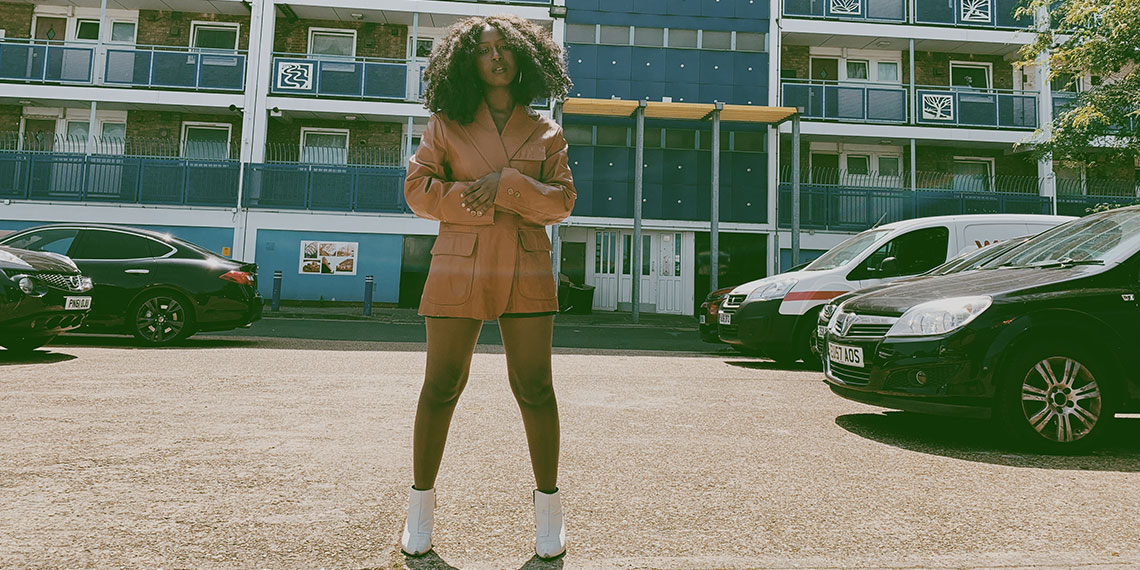As 2020 continues to be the most toxic figure in all of our lives, we’ve probably all felt at one point or another like the president of the Sad Girls Club. With an Instagram bio that reads, “I’ve honestly been tired and fed up since year 8”, London-based R&B and soul singer VEDA BLACK knows that feeling all too well, and her new EP, premiering exclusively on Betches, is appropriately entitled Sad Girls Club. Her soulful, melodic music is perfect for fans of Solange and Ari Lennox, or anyone else who needs a new album to chill to.
The five-piece EP certainly shows off VEDA’s skills as a singer, composer, and producer (Sad Girls Club is self-produced), but it also highlights her strength as a writer. In Sad Girls Club, VEDA openly sings about the mental, physical, and environmental journey she has been on over the last few years. The EP largely tackles her struggle and relationship with her mental health, rejecting compulsory heterosexuality and finally feeling comfortable living as her authentic self. She opens up to Betches about what that journey has been like for her, telling us, “It has been a difficult yet enlightening journey that I am still on” (full interview below).
With a mellow sound and raw lyrics, VEDA has been compared to the likes of SZA and was a 2018 finalist in Afropunk Festival’s battle of the bands. Her first single, “Call It Love,” has already garnered attention from BBC1 Xtra and will definitely make you ~feel all the feels~. The rest of her EP is just as empowering and relatable, and Betches readers can get an exclusive first listen to Sad Girls Club now, out July 24.
We chatted with VEDA about her influences, mental health tips, Black Lives Matter, and more below.
Who are your main musical influences, and how would you describe your style?
I have a very broad taste but my main influences span from Donny Hathaway and Mariah Carey to Destiny’s Child and Tyler the Creator. My musical style sits somewhere between 90s RnB and alternative soul.
Your debut single for the EP is titled ‘Call It Love.’ What does love look like to you?
It is a tricky one trying to define love or how it looks, because I believe it varies from person to person and each experience is totally different. Saying that, I think a healthy love definitely should feel safe and familiar but should allow you the opportunity to grow. I think it’s about mutual respect, care and trust, and also taking responsibility for your actions. Being able to connect intellectually, romantically, or sharing values you are passionate about is magical and getting to experience that whilst we are on this planet is really a gift.
Can you talk a little about what the journey was like to live your authentic self?
It has been a journey. One thing I have been abundantly certain about myself since I was a kid is that gurl…I knew I was not straight. However, I really struggled to communicate this and growing up I did not see many examples of other black queer people on the television or in music. I fell into relationships with men not because I wanted to be with them, but because we live in a heteronormative society that enforces that this is how we should live our lives. These relationships felt forced and somewhat unnatural to me. I did not personally know any other queer black women like myself until I finished uni, where my circle at the time was quite straight and white. After I graduated I met someone and we had an incredible but difficult relationship, it was kept quiet for various reasons but she taught me a lot about myself and things started to make sense. This also inspired me to write “Call It Love.” My friendship group changed drastically and finally I felt valid and loved for me and not as the token Black friend. I met and spoke with other queer people who could relate with my experiences and I felt no judgement at all. I am grateful to have a partner who is completely loving and accepting of me as a queer polyamorous woman and has allowed me space and support which has also helped me tremendously in accepting and living life as my authentic self. So really it is a massive thanks to my circle of baes for helping me along this journey.
What was the process of creating your debut EP, ‘Sad Girls Club,’ like? What inspired the title?
The title of the EP was inspired by the title track, which I wrote last year before the idea of the EP was even a thing. I had a really bad year with my mental health and could not even bring myself to pick up my guitar for months. After a short break from releasing music and a trip to New York with my baes, I came back and started writing about what had been on my mind over the last couple of months, which is how the title track “Sad Girls Club” was born. This EP was the first project that I took full creative ownership over and fully produced myself. The experience in itself was one of the most vulnerable and enjoyable ever. I really learned to trust in my ear and my vision and how I wanted to tell my story both lyrically and through the arrangement and production of the music. 
What does being a “sad girl” mean to you?
For me personally I have always been a bit of a sad girl since I was a kid. I have always been a sensitive individual who overthinks everything. This is not a bad thing. I know a lot of other people who can relate to feeling like this. Especially as a Black woman, where your existence is constantly policed and people have this idea that we don’t feel pain as easily, which is an extremely harmful and is why Black women have a higher risk of dying in childbirth or not being referred to mental health specialists (but that’s a whole topic in itself…), is why I am embracing my sad girl self. I want to remind myself and others that it is okay to feel sad and that we are allowed to and should sit in those feelings.
Can you talk a little about your mental health journey?
I, like many people, have battled with depression and anxiety over the years for various reasons. At some of my most difficult moments and times of desperation, I have contemplated whether it was worth continuing if I was going to feel like this again. It was really over the last few years where I found myself being surrounded by a much healthier circle of people who have shown me nothing but love and compassion, that I felt less shame and realised my feelings were and are totally valid. I have since done a lot of work on myself, my confidence and my identity. It has been a difficult yet enlightening journey that I am still on. I accept that I will never suddenly be “cured.” However, living with and accepting this as part of me and something that does not need to be changed has been really eye opening for me.
What is the best piece of advice you could give or have gotten when you are having a difficult mental health day?
I remember my year 7 teacher giving me some advice which I will never forget: “Take each day at a time as it comes.” It’s not always easy to do so, but practising being present and trying to stay grounded is really helpful for me when I am having a difficult mental health day. Also feeling no shame and accepting that it is also ok not to feel ok. There’s no “quick fix” and the pressure of trying to find one can often be very overwhelming. For me, it is about learning that it is okay to sit in an uncomfortable feeling.
What’s your self-care routine/process?
I should say exercising, keeping a healthy eating diet etc. which for the most part is true (except I HATE exercise) but honestly I love to binge watch trash TV. Self-care for me is indulging and treating myself. Ordering some cookie dough because why not, a quick face mask and a podcast or learning how to cook a new meal. Picking up the guitar to play and then getting bored after an hour. I work a full time desk job and manage myself as an artist, so when I’m not working I treat myself when I can. It’s my way of trying to balance my schedule without burning out.

You are vocal about your support for the Black Lives Matter movement. Where do you see room for improvement in the music industry? What about the world in general?
I think there needs to be more Black people in positions of all different levels within the industry. Gatekeepers need to be ensuring they are amplifying Black voices and offering opportunities to Black artists. Festival lineups are still very white, straight, and male, and this is something that needs to change. I also notice a lot of white, cisgender, and straight male R&B artists being championed while Black artists are not being offered the same opportunities. It would be great to see the same energy for championing Black R&B artists, particularly Black queer womxn and Black non-binary people. The same goes for other industries such as fashion and healthcare. We need to have more Black people in leadership roles if we want to see actual change. It is also important to note that it should not be the responsibility of Black people to dismantle racism. The onus should be on white people to actively educate themselves and to have uncomfortable conversations with those around them. This is just the start and the bare basics if we really want to tackle systemic racism and anti-Blackness.
Was it a deliberate choice to release your EP at this moment in time? Are there any messages that listeners might find particularly helpful as they’re coping with social isolation?
It all came together in a completely organic and random way. I was very nervous about releasing “Call It Love” as this was my first release after almost 2 years out of the game. However, the support and reception really gave me the confidence to pull this EP together. I am usually a calculated and careful individual, but once I have a plan or idea in my head, I have to see it through. The Capricorn in me really jumped out and I really felt like now was the right time to release it. It is an incredibly personal project and is about my experiences, my mental health and my identity, but I hope that listeners can take away the message of the importance of self-love and practising not to not blame yourself. To instead be vulnerable with the right people and practise softness and kindness with ourselves.
Images: VEDA BLACK (2)








































